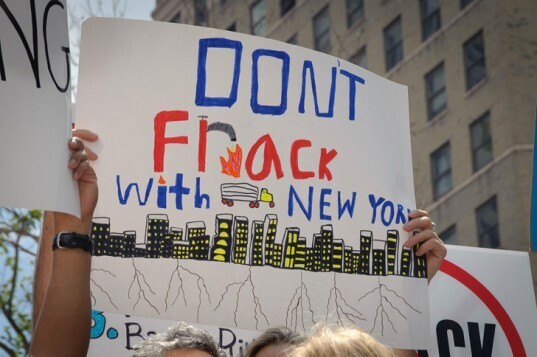 Environmental Defense Fund (EDF), unlike some other
environmental groups which support a ban on
fracking,
argues that natural gas
extraction can be
done responsibly, perhaps reflecting the views of board members
profiting from active fracking investments.
Environmental Defense Fund (EDF), unlike some other
environmental groups which support a ban on
fracking,
argues that natural gas
extraction can be
done responsibly, perhaps reflecting the views of board members
profiting from active fracking investments.
“Hydraulic fracturing isn’t all good, but it doesn’t have to be all bad, either,” an EDF blog post summarized in May of this year.
The organization’s top natural gas official, vice president Mark Brownstein, responded to this week’s New York state ban on hydraulic fracturing with an ambiguous statement:
“The risks associated with hydraulic fracturing and unconventional oil and natural gas development are so serious, EDF believes that every state has the right to decide whether or not development is consistent with the interests and wishes of its citizens. New York State has made its decision—but with or without drilling here, New York remains the country’s fifth largest natural gas consumer, with an extensive network of gas transmission and distribution lines. Methane leaking from these systems has more than 80 times the climate-warming power of carbon dioxide over a 20-year timeframe. State officials and the companies that operate these pipes need to find and fix those leaks as part of the ongoing effort to modernize New York’s electric and gas infrastructure and accelerate the state’s transition to cleaner, renewable, and more efficient energy.”
EDF’s approach to environmentalism is pro-market, built upon investment strategies and corporate partnerships. The organization has partnered with dozens of companies in the natural gas industry for a suite of studies on methane leakage from fracking, storage, and distribution.
Meanwhile, several members of EDF’s board of trustees, who provide millions in funding for the organization, are actively invested in fracking. (This is far from unique among environmental non-profits.)
The board member with the strongest conflict of interest is Edward Stern, an active investor in fracking and a direct funder of pro-fracking front groups in New York, although he is not the only problematic trustee.
Edward Stern is the founder of Hartz Capital, which focuses “on the acquisition of properties for the development of oil and gas in emerging shale plays.” Hartz owns shale gas leases in upstate New York and funded the pro-fracking front group Clean Growth Now.
Trustee Kristine Johnson is wife of Tim Dattels, of TPG Capital. In 2007, TPG Capital was part of a consortium that purchased TXU Corp for $48 billion, and closed several high-pollution coal plants, a move touted by an actively involved EDF. That investment is now effectively worthless, in part because of the fracking boom.
However, TPG has also poured billions into successful fracking investments. In 2011, TPG Capitol formed Maverick American Natural Gas, a fracking company, with Hughes and Hart. In 2013, TPG sold its stakes in tar-sands and shale-oil refiner Northern Tier Energy (in which TPG had invested about $200 million in 2010), natural gas pipeline giant Copano Energy (in which TPG invested $300 million in 2010), and fracking equipment company Valerus Field Solutions (in which TPG had invested $500 million in 2009). In February 2014 TPG announced it was building a new $1.25 billion fund to invest in similar companies. In March of this year Maverick acquired $1.8 billion worth of active fracking wells in Wyoming’s Jonah field from the Canadian oil and gas giant Encana.
Hedge-fund billionaire Julian H. Robertson, Jr., who bankrolled the 2012 Mitt Romney run, is also an active fracking investor. The 80-year-old has been one of EDF’s largest donors, putting in over $60 million to support EDF’s cap-and-trade push during the 2000s. Robertson is now mostly retired, but is an advisor to Tiger Infrastructure Partners, a fund formed in 2009 with over $500 million invested in “midstream oil and gas fracking companies in a joint venture with Kiewit.
There are also several trustees with smaller but meaningful investments in the fossil-fuel industry.
Trustee Susan Mandel is the wife of Stephen Mandel, whose Lone Pine Capital has holdings in the liquid natural gas giant Cheniere Energy.
Trustee G. Leonard Baker, Jr. is a partner in the Silicon Valley venture capital firm Sutter Hill Ventures, whose holdings include Chengwei Capital, which invests in oil & gas ventures in China.
Trustee Ann Doerr is the wife of Kleiner Perkins Caulfield Byers venture capitalist John Doerr. Most of Kleiner Perkins’ energy investments are in the clean tech space, but it has some “cleanish” fossil-fuel investments as well. Portfolio company Luca Technologies “owns and operates wells and infrastructure, then sells natural gas into existing markets,” and portfolio company GreatPoint Energy does coal-to-gas conversion.
EDF’s board also includes two scions of influential conservative families—Sam Rawlings Walton, grandson of Sam Walton, and Kathryn Murdoch, daughter-in-law of News Corp’s Rupert Murdoch.
Interestingly, Katherine Lorenz, the granddaughter of George Mitchell, the “father of fracking,” is on the board.